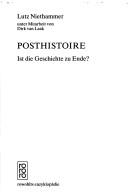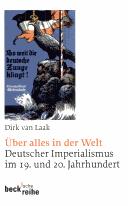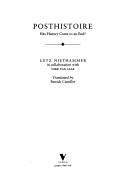| Listing 1 - 10 of 18 | << page >> |
Sort by
|
Book
ISBN: 9783103973525 3103973527 Year: 2018 Publisher: Frankfurt am Main : Fischer,
Abstract | Keywords | Export | Availability | Bookmark
 Loading...
Loading...Choose an application
- Reference Manager
- EndNote
- RefWorks (Direct export to RefWorks)

ISBN: 305003744X Year: 2002 Publisher: Berlin Akademie Verl.
Abstract | Keywords | Export | Availability | Bookmark
 Loading...
Loading...Choose an application
- Reference Manager
- EndNote
- RefWorks (Direct export to RefWorks)

ISBN: 3499555042 Year: 1989 Publisher: Reinbek bei Hamburg Rowohlt
Abstract | Keywords | Export | Availability | Bookmark
 Loading...
Loading...Choose an application
- Reference Manager
- EndNote
- RefWorks (Direct export to RefWorks)
Civilization, Modern --- -History --- -Annals --- Auxiliary sciences of history --- Modern civilization --- Modernity --- Civilization --- Renaissance --- Philosophy --- History --- Philosophy. --- -Philosophy --- History, Modern --- Twentieth century
Book
ISBN: 9783835332133 3835332139 Year: 2018 Publisher: Göttingen : Wallstein,
Abstract | Keywords | Export | Availability | Bookmark
 Loading...
Loading...Choose an application
- Reference Manager
- EndNote
- RefWorks (Direct export to RefWorks)
Holocaust, Jewish (1939-1945) --- Nationalism --- Nationalism. --- History --- Eichmann, Adolf, --- Eichmann, Adolf, --- Holocaust, Jewish (1939-1945). --- 1900-1999. --- Germany.
Book
ISBN: 9783525300152 Year: 2011 Publisher: Göttingen Vandenhoeck & Ruprecht
Abstract | Keywords | Export | Availability | Bookmark
 Loading...
Loading...Choose an application
- Reference Manager
- EndNote
- RefWorks (Direct export to RefWorks)

Abstract | Keywords | Export | Availability | Bookmark
 Loading...
Loading...Choose an application
- Reference Manager
- EndNote
- RefWorks (Direct export to RefWorks)
Imperialism --- Colonialism --- Empires --- Expansion (United States politics) --- Neocolonialism --- Political science --- Anti-imperialist movements --- Caesarism --- Chauvinism and jingoism --- Militarism --- Germany --- Foreign relations --- History --- 19th century --- 20th century
Book
ISBN: 9780230279643 0230279643 Year: 2018 Publisher: Basingstoke, Hampshire : Palgrave Macmillan,
Abstract | Keywords | Export | Availability | Bookmark
 Loading...
Loading...Choose an application
- Reference Manager
- EndNote
- RefWorks (Direct export to RefWorks)
Over the course of 150 years, Europe's protean technologies inspired and underpinned the globalizing ambitions of European nations. This book aims to show how technology mediated European influence in the rest of the world and how this mediation in turn transformed Europeans. Europeans mapped, they exploited, and they exchanged - their interactions ranged from technological and biological genocide to treaties of cooperation and the construction of elaborate colonial infrastructures. Quite aside from the enormous variety of political settings, cultures and colonial programs, interrelations created dependencies on both sides. Cultural transfers were rarely unidirectional, and often a kind of Pidgin-knowledge emerged, a hybrid fusion of European and local knowledge and skills. As observers have rightly pointed out, Europe played both the role of 'Prometheus unbound' and the 'Sorcerer's apprentice'.
Globalization --- Technology --- History. --- History --- Europe --- Colonies --- Foreign relations --- Technology - Europe - History --- Globalization - History --- Europe - Foreign relations
Book
ISBN: 9780230279636 0230279635 Year: 2016 Publisher: New York, N.Y. palgrave macmillan
Abstract | Keywords | Export | Availability | Bookmark
 Loading...
Loading...Choose an application
- Reference Manager
- EndNote
- RefWorks (Direct export to RefWorks)
Over the course of 150 years, Europe's protean technologies inspired and underpinned the globalizing ambitions of European nations. This book aims to show how technology mediated European influence in the rest of the world and how this mediation in turn transformed Europeans. Europeans mapped, they exploited, and they exchanged - their interactions ranged from technological and biological genocide to treaties of cooperation and the construction of elaborate colonial infrastructures. Quite aside from the enormous variety of political settings, cultures and colonial programs, interrelations created dependencies on both sides. Cultural transfers were rarely unidirectional, and often a kind of Pidgin-knowledge emerged, a hybrid fusion of European and local knowledge and skills. As observers have rightly pointed out, Europe played both the role of 'Prometheus unbound' and the 'Sorcerer's apprentice'. --
Colonisation. Decolonisation --- History of Europe --- anno 1800-1899 --- anno 1900-1999 --- anno 2000-2009 --- anno 2010-2019 --- Technology --- Globalization --- 338 <09> --- 338 (4) --- 338 (4) Economische situatie. Economische structuur van bepaalde landen en gebieden. Economische geografie. Economische produktie.economische produkten. Economische diensten--Europa --- Economische situatie. Economische structuur van bepaalde landen en gebieden. Economische geografie. Economische produktie.economische produkten. Economische diensten--Europa --- 338 <09> Economische geschiedenis --- Economische geschiedenis --- History --- Europe --- Foreign relations.

ISBN: 0860913953 Year: 1992 Publisher: London Verso
Abstract | Keywords | Export | Availability | Bookmark
 Loading...
Loading...Choose an application
- Reference Manager
- EndNote
- RefWorks (Direct export to RefWorks)
Civilization, Modern --- History --- Philosophy
Book
ISBN: 0262375958 0262375966 9780262375962 Year: 2023 Publisher: Cambridge MIT Press
Abstract | Keywords | Export | Availability | Bookmark
 Loading...
Loading...Choose an application
- Reference Manager
- EndNote
- RefWorks (Direct export to RefWorks)
A comprehensive history and examination of global infrastructures and the outsized role they play in our lives.Infrastructure is essential to defining how the public functions, yet there is little public knowledge regarding why and how it became today's strongest global force over government and individual lives. Who should build and maintain infrastructures? How are they to be protected? And why are they all in such bad shape? In Lifelines of Our Society, Dirk van Laak offers broad audiences a history of global infrastructures--focused on Western societies, over the past two hundred years--that considers all their many paradoxes. He illustrates three aspects of infrastructure: their development, their influence on nation building and colonialism, and finally, how individuals internalize infrastructure and increasingly become not only its user but regulator.Beginning with public works, infrastructure in the nineteenth century carried the hope that it would facilitate world peace. Van Laak shows how, instead, it transformed to promote consumerism's individual freedoms and our notions of work, leisure, and fulfillment. Lifelines of Our Society reveals how today's infrastructure is both a source and a reflection of concentrated power and economic growth, which takes the form of cities under permanent construction. Symbols of power, van Laak describes, come with vulnerability, and this book illustrates the dual nature of infrastructure's potential to hold nostalgia and inspire fear, to ease movement and govern ideas, and to bring independence to the nuclear family and control governments of the Global South.
| Listing 1 - 10 of 18 | << page >> |
Sort by
|

 Search
Search Feedback
Feedback About UniCat
About UniCat  Help
Help News
News